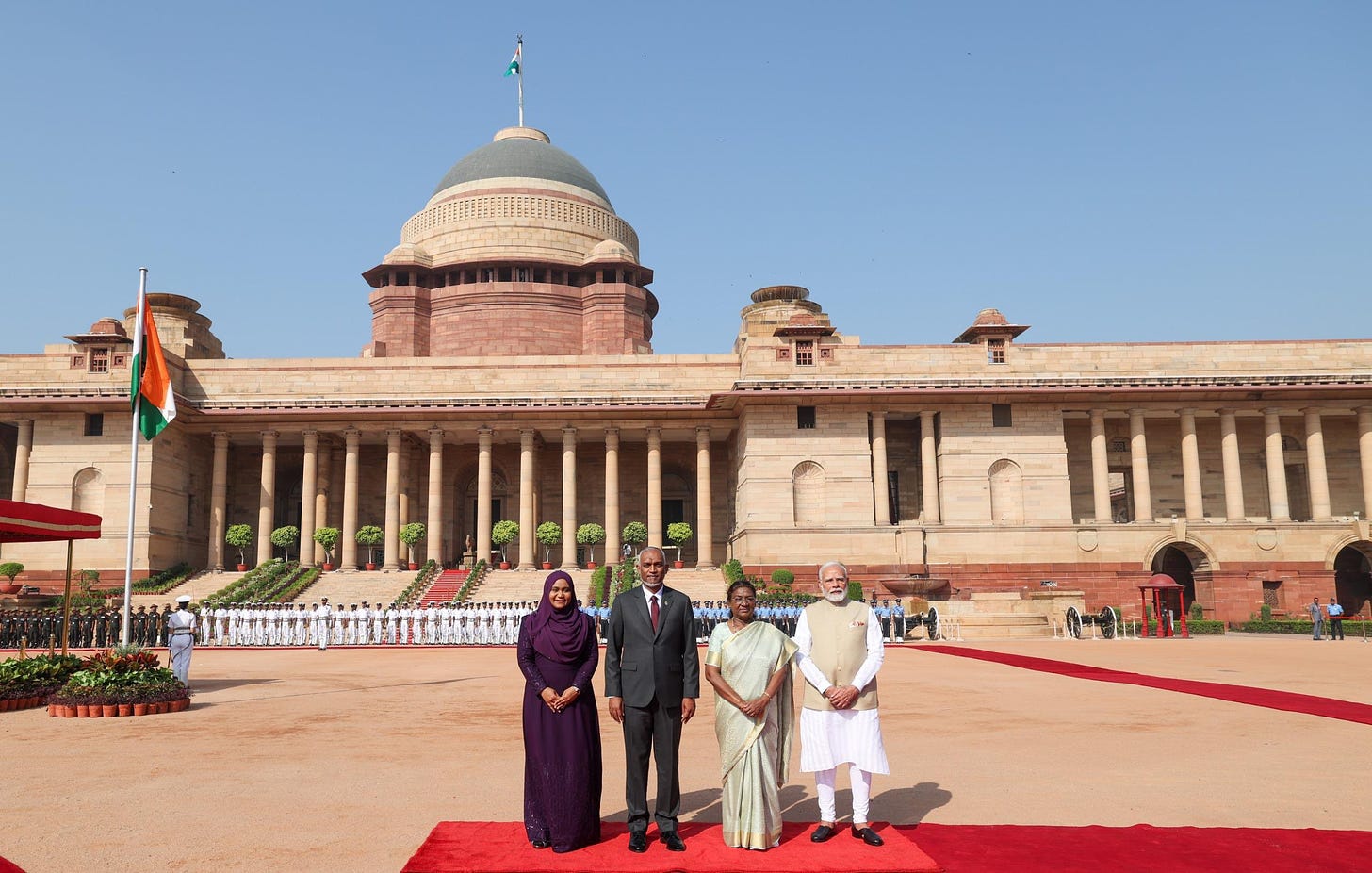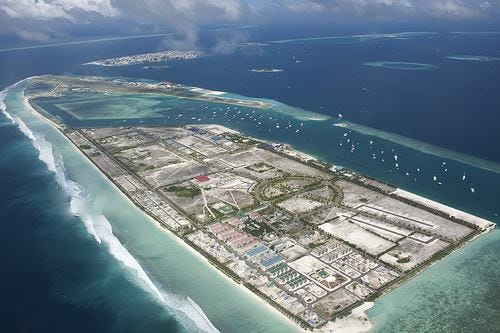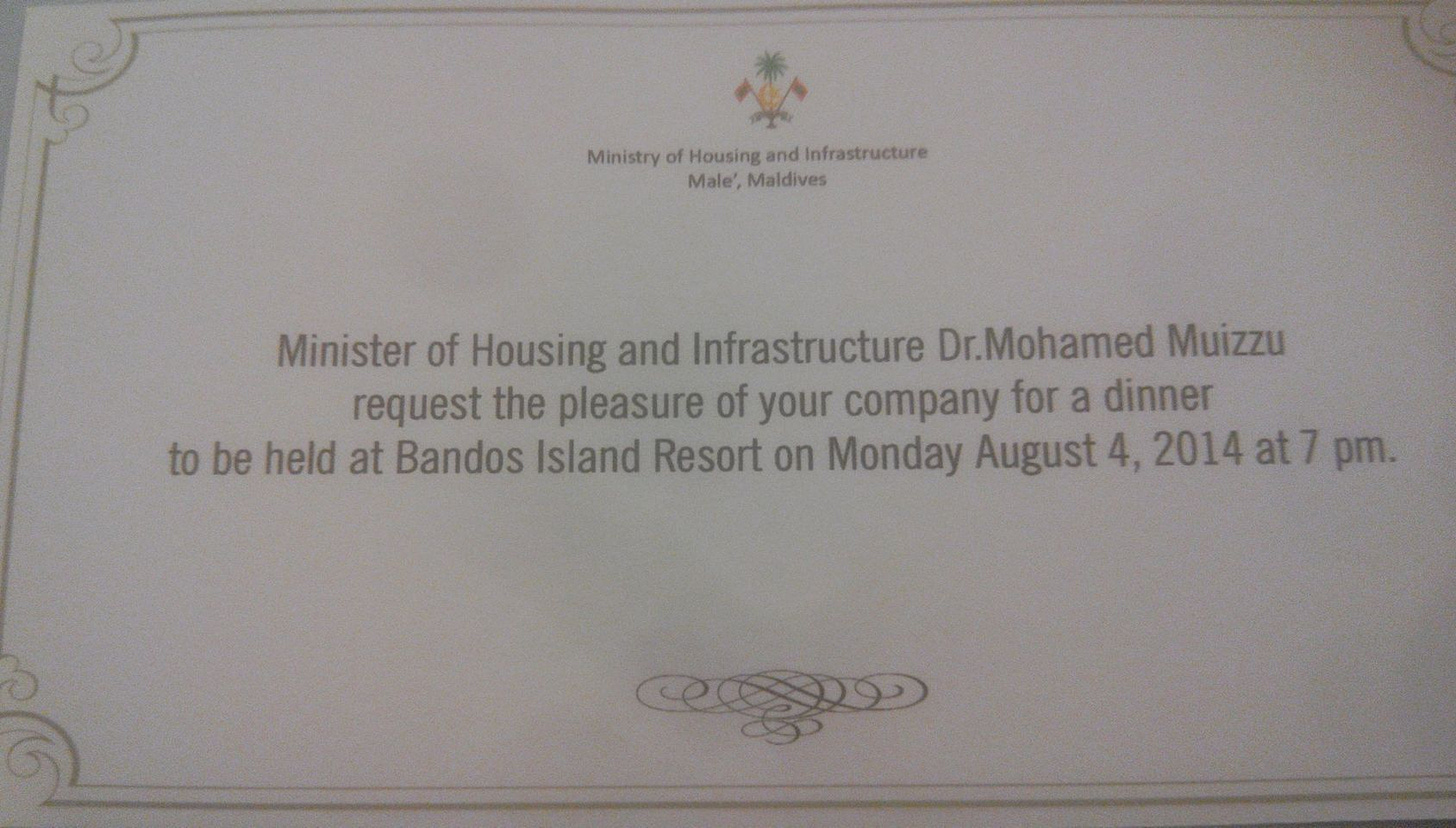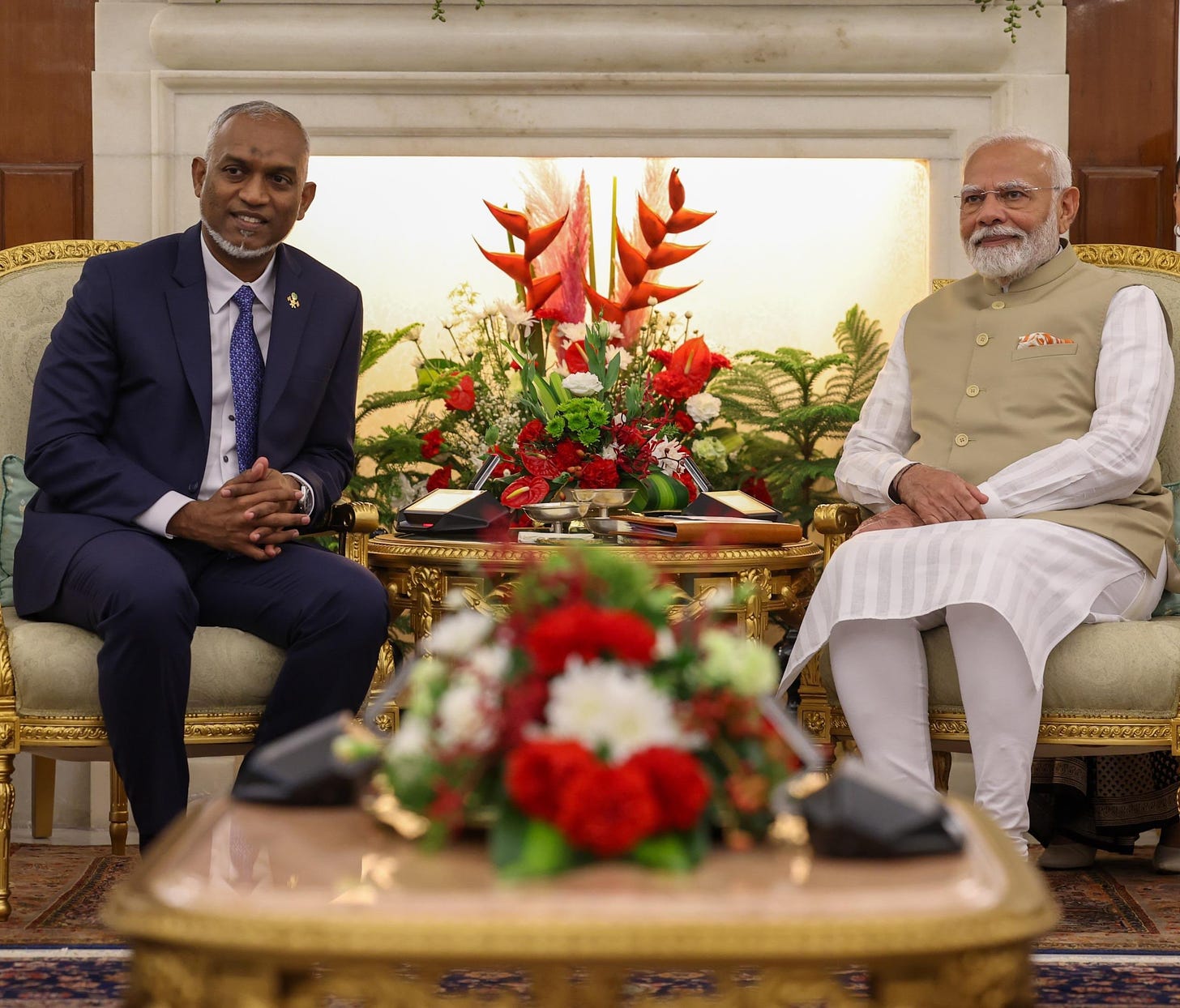India-Maldives Relations: Making Up for the Lost Decade
Navigating a Strategic Reset in the Indian Ocean: Reflections on my 2014 Official Visit to the Maldives during Dr. Muizzu’s Tenure as Minister of Housing and Infrastructure.
India-Maldives: Resuscitating Strategic Ties
President Mohamed Muizzu’s recent state visit to India, concluding on 8 October 2024, marks a pivotal moment in the evolving relationship between the two Indian Ocean neighbours. This visit, characterised by substantial financial aid and renewed commitments across various sectors, reflects a strategic reset after years of strained ties. The importance of this diplomatic breakthrough cannot be overstated, especially considering the significant shift from the tensions that had dominated their relations earlier this year. As we analyse the key outcomes of this visit, it is crucial to understand the broader geopolitical shifts that have shaped India-Maldives relations over the past decade, setting the stage for this potentially transformative phase in their partnership.
Key Outcomes of President Muizzu’s Visit
President Muizzu’s visit to India resulted in a comprehensive financial aid package and several agreements aimed at bolstering economic, infrastructure, and security cooperation between the two nations.
Financial Support: India pledged over ₹6,300 crore (approximately $760 million) in aid, including:
A $400 million currency swap agreement
₹3,000 crore (₹30 billion) in additional support
A rollover of $100 million worth of treasury bills by the State Bank of India
Economic Cooperation:
Launch of the RuPay card in the Maldives to enhance economic ties and tourism between the nations
Discussions on a potential Free Trade Agreement to deepen commercial relations
Infrastructure Development:
Inauguration of the runway at Hanimaadhoo International Airport, developed with Indian assistance
Handover of 700 out of 4,000 housing units funded by Indian aid
Maritime Security: A key area of agreement focused on bolstering the Maldives' maritime surveillance capabilities through Indian-supplied equipment and assets, an important step in securing the shared maritime domain of the Indian Ocean.
These developments suggest that both nations are intent on mending fences after a period of tension and mutual distrust.
A Challenging Decade of Relations
The recent thaw in relations stands in stark contrast to the strained atmosphere that defined much of the last decade. The cooling of ties can largely be attributed to the Maldives’ increasing engagement with China, leading to concerns in India about diminishing influence in the Indian Ocean region.
The Rise of Chinese Influence:
Starting in 2014, China’s economic and strategic footprint in the Maldives grew significantly, including major infrastructure investments and the signing of a Free Trade Agreement (FTA) between the two countries.
The number of Chinese tourists to the Maldives tripled between 2010 and 2014, symbolising deepening ties.
India’s concerns were heightened as China’s Belt and Road Initiative (BRI) began to reshape the Maldives' strategic orientation.
India’s Waning Influence:
One of the most symbolic setbacks for India occurred in 2012 when a $511 million contract awarded to an Indian company for the development of Malé's airport was abruptly cancelled by the Maldivian government.
Domestic politics in the Maldives also played a role in this deterioration, with the rise of the ‘India Out’ campaign, which called for the removal of Indian military personnel stationed in the Maldives.
Strategic Implications for India: The Maldives’ drift towards China was a significant concern for India, given its strategic location along vital shipping lanes in the Indian Ocean. The prospect of Chinese military or strategic presence in the Maldives was viewed as a potential threat to India’s maritime security and regional influence.
Recalling My Official Visit to the Maldives in 2014
In August 2014, during my tenure as Joint Secretary in the Ministry of Housing, Government of India, I had the privilege of visiting the Maldives as part of the Conference of Housing Ministers of Asia and the Pacific. In my ex-officio capacity, I served as the Secretary-General of the Conference, which brought together key representatives from across the region to discuss pressing housing and infrastructure challenges. It was during this visit that I had the privilege of meeting Dr Mohamed Muizzu, who was then the Minister of Housing and Infrastructure in the Maldivian government—a role he held with distinction from 2012 to 2018. My interactions with Dr Muizzu during this time gave me unique insights into his vision and leadership style, which has undoubtedly shaped his current role as President of the Maldives.
The Conference provided an ideal platform for member nations to exchange ideas on sustainable development, affordable housing, and urban planning. However, what stood out to me most was the visible involvement of China in the Maldives' infrastructure development. Compared to India and other participating nations, China’s footprint—both in terms of expenditure and the scale of its projects—was far more prominent. It was evident that China was positioning itself as a major player in shaping the Maldives' urban and infrastructural landscape, a dynamic that has since influenced the country's foreign relations and strategic priorities.
Mohamed Muizzu’s Leadership and Vision
During the visit, Dr. Muizzu personally guided the delegates from India, South Korea, and Iran on a tour of some of the most ambitious infrastructure projects, including the massive reclamation of Hulhumalé—an island literally built out of the ocean. His enthusiasm for the project was palpable as he outlined the vision for Hulhumalé, a newly reclaimed island connected to Malé International Airport by road—something even the capital city of Malé could not boast. The scale and ambition of this project were a testament to the Maldives' determination to combat the challenges of rising sea levels and land scarcity. The development of Hulhumalé was positioned as the solution to future urban expansion, offering a mix of residential, commercial, and recreational spaces.
At the time, Dr Muizzu’s leadership was instrumental in driving these transformative changes, and the conference allowed me to witness first-hand his capability in spearheading long-term projects of national importance. Now, as President of the Maldives, he is navigating the same delicate balance between development and diplomacy, and it’s fascinating to see how the seeds of his strategic outlook were planted during his tenure as Housing Minister.
The Withdrawal of Indian Military Personnel
One of the most contentious issues between the two nations during this period was the presence of Indian military personnel in the Maldives. President Muizzu, who rose to power on the back of the ‘India Out’ movement, set a May 10, 2024 deadline for the complete withdrawal of Indian military personnel. By May 9, all 89 Indian soldiers had been repatriated, replaced by civilian employees from Hindustan Aeronautics Limited.
Operational Continuity: The Indian military personnel had been responsible for operating helicopters and a Dornier aircraft, primarily used for medical evacuations and search-and-rescue missions. Their replacement with civilian technicians ensured that these critical operations could continue uninterrupted.
Sovereignty Concerns: The Maldivian government presented this development as a move to regain “full sovereign command and control” over its territory and assets, a key demand of the ‘India Out’ campaign.
While the withdrawal of military personnel was portrayed as a symbolic victory for Maldivian sovereignty, it also highlighted the delicate balancing act the Maldives must perform between India and China1.
Economic Challenges and Debt Diplomacy
The Maldives is grappling with a challenging economic landscape, burdened by significant debt, much of it owed to foreign creditors. As of 2024, the Maldives’ total foreign debt stands at $3.99 billion, amounting to 113% of its GDP.
China as a Major Creditor: 53% of the Maldives’ public and guaranteed external loans are owed to China. These loans, accrued mainly through infrastructure projects funded under the Belt and Road Initiative, have placed the Maldives in a precarious financial position.
India’s Role: India remains a key creditor, and the Maldives has sought debt relief from New Delhi, requesting a postponement of the repayment of $150 million from a $200 million loan India provided in 2019.
This financial dependency underscores the importance of India’s support to the Maldives’ economic stability and the broader strategic implications of such aid.
A Complex Diplomatic Balancing Act
As the Maldives attempts to navigate its relationships with both India and China, it faces the challenge of maintaining a delicate balance between the two powers. President Muizzu’s moderation of the ‘India Out’ stance indicates a recognition of India’s critical role in the Maldives' socio-economic development and security. However, China’s economic presence continues to loom large.
Summing Up: Cautious Optimism and Future Prospects
President Muizzu’s recent visit to India represents a pragmatic recalibration of Maldives’ foreign policy. The financial assistance package from India is a significant step towards addressing the Maldives’ economic vulnerabilities, and the renewed focus on maritime security and infrastructure development signals a mutual commitment to maintaining stability in the Indian Ocean.
However, the future of India-Maldives relations will depend on how both nations navigate the shifting geopolitical landscape. As the Maldives seeks to balance its ties with India and China, careful diplomacy will be required to ensure that its sovereignty and economic interests are protected without alienating either of its powerful neighbours.
In this context, the reset in relations presents opportunities but also challenges. For India, keeping the Maldives close will require sustained economic engagement and strategic cooperation. For the Maldives, the path forward involves balancing its domestic political imperatives with its foreign policy priorities, while leveraging its unique position in the Indian Ocean.









…….though the reset in relations presents opportunities but also challenges in shape of close eye on India by superpower China through its ally Maldives. India will have to be thousand times careful while dealing with Maldives henceforth onwards. After all, change in Maldives’s heart would not be self-conceived…….